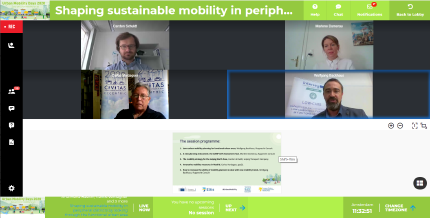LOW-CARB at the 2020
Urban Mobility Days
05.10.2020
The Urban Mobility Days (UMD) is the first of a series of annual conferences combining two of the previous major European mobility events: CIVITAS conference and the SUMP conference. This year’s edition of UMD took place online. The four-day event, between 29 September and 02 October, sought to bring together various stakeholders in the sustainable transport and mobility industry to exchange knowledge, best practices, and current projects that showcase innovations for the transition to low-carbon cities and regions.
Three projects joined forces to organise a side session dedicated to exploring the mobility planning in areas that are not always paid specific attention in the general SUMP process. The 90-minute session focused on how sustainable mobility in peripheral districts can be better shaped by assessing mobility at the scope of a functional urban area. This approach was used to guide practitioners through the integrated mobility planning process (the SUMP cycle) by demonstrating successful measures and planning processes from the InterregCE projects of LOW-CARB and Dynaxibility4CE, and from the Civitas project ECCENTRIC. In doing so, the audience gained valuable practical steps of how to make mobility planning in peripheral districts and at the functional urban area level a more dynamic and flexible process. The session was also live-tweeted by LOW-CARB’s Communications Manager, Saydrina Govender.

Marlene Damerau, mobility consultant at Rupprecht Consult, presented a newly developed planning instrument which supports local and regional authorities when reflecting on their current mobility planning situation. The SUMP Self-Assessment Tool was described and shown to benefit mobility planning at different geographic scopes and scales.
Carsten Schuldt, mobility expert at Leipzig Transport Company presented the development of a mobility strategy for the Leipzig North Area (an industrial and business peripheral district in the functional urban area of Leipzig). This is a masterplan defined by public transport and inter-modality services enhanced to improve commuting flows at peak hours.
Dr. Carlos Verdaguer, an integrated urban planning and mobility expert of Gea21 and technical manager of the Civitas ECCENTRIC project, presented a measure package implemented in Madrid to enhance sustainable mobility in districts outside of their city centre.
Finally, Dr. Wolfgang Backhaus presented on how a new project from an experimental call in the Interreg Central Europe program capitalizes on integrating outputs from Interreg and Horizon 2020 projects. Dynaxibility4CE aims increase the capability of mobility planners in dealing with new sporadic mobility trends in a manner that allows for dynamic and flexible changes to mobility situations.
All speakers engaged after presentations in interactive discussions with participants. The new Topic Guide on mobility planning in peripheral districts and functional urban areas, soon to be released, was also announced, and all participants will have the possibility to get involved in reviewing it before it is officially published.
Downloads
Presentations
1. Marlene Damerau
SUMP self assessment tool
2. Carsten Schuldt
Master development plan for Leipzig
3. Carlos Verdaguer
Civitas ECCENTRIC mobility solutions in Madrid
4. Wolfgang Backhaus
Intro to Interreg LOW-CARB and Dynaxibility4CE
Webinar Recording
The session's recording is available on Youtube.
